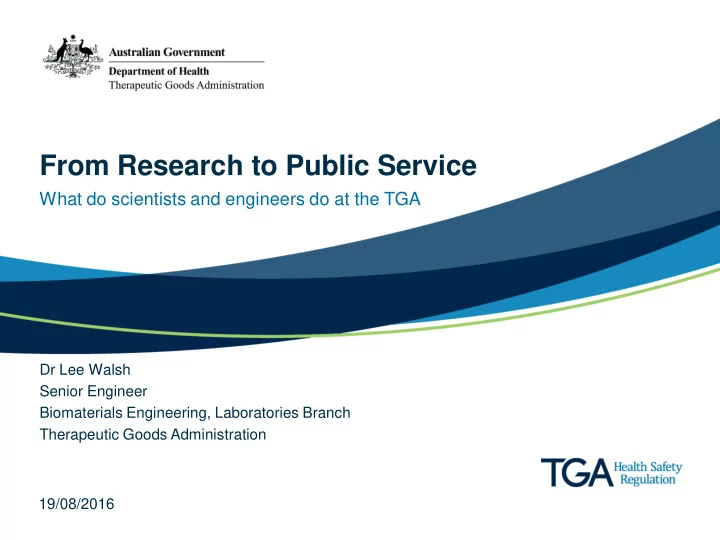

From Research to Public Service What do scientists and engineers do at the TGA Dr Lee Walsh Senior Engineer Biomaterials Engineering, Laboratories Branch Therapeutic Goods Administration 19/08/2016
Who is the TGA? • The Therapeutic Goods Administration was established in 1990 to “ safeguard and enhance the health of the Australian community through effective and timely Health regulation of therapeutic goods” Safety Regulation • It provides a national system of controls relating to the quality, safety, efficacy and timely availability of therapeutic goods used in, or exported from, Australia From Research to Public Service 1
Who is the TGA? • We are part of the Australian Government Department of Health • Every decision the TGA makes is based on the Therapeutic Goods Act 1989 • Main offices in Canberra – satellite offices in Sydney, Melbourne, Adelaide and Brisbane • Operations are primarily cost recovered (98%) industry pays fees for making applications and annual charges for products they are responsible for From Research to Public Service 2
Where is the TGA? Kangaroos Birds Lizards/snakes From Research to Public Service 3
Where is the TGA? Purpose built science and engineering building From Research to Public Service 4
Who works at the TGA? Approximately 750 staff made up of: Biomedical Engineers Physiotherapists Medical officers scientists Pharmacists Nurses Toxicologists Lawyers Nutritionists Dieticians Scientists Administrative staff From Research to Public Service 5
What Sci/Eng do at the TGA Lab work From Research to Public Service 6
What Sci/Eng do at the TGA Reading and writing From Research to Public Service 7
What Sci/Eng do at the TGA Analysis From Research to Public Service 8
What Sci/Eng do at the TGA Advise & collaborate From Research to Public Service 9
What Sci/Eng do at the TGA Make recommendations and decisions From Research to Public Service 10
My roles at the TGA Medical devices Pre-market (device assessor) Post-market (laboratories) • Technical expert • Technical leader – Assess new devices for safety – Design testing programs and performance – Laboratory testing – Make recommendations to – Technical assessments decision makers – Develop methods and standards – Learn about new devices – Learn about devices – Write expert reports – Write lab and expert reports – Develop internal policy and – Develop internal policy and systems systems – Provide technical expertise – Provide technical expertise From Research to Public Service 11
Advantages of being an APS • Job security • Good salary (vs research) • Excellent working conditions Advantages of working at the TGA • High impact work • The work is technically and professionally challenging • Variety of work relating to medicines and medical devices • Work with a variety of experts (technical, medical, legal) • Technical skills, expertise, and experience are highly valued From Research to Public Service 12
Where would neuroscientists fit? Biomedical scientists Engineers Physiotherapists Medical officers Pharmacists Nurses Toxicologists Lawyers Nutritionists Dieticians Scientists Administrative staff From Research to Public Service 13
Where to find positions at the TGA? • The usual places • TGA Employment and job vacancies – https://www.tga.gov.au/employment-job-vacancies – Navigate from theTGA website footer • APS Jobs – http://www.apsjobs.gov.au – Search under Dept/Agency: Therapeutic Goods Administration From Research to Public Service 14
Recommend
More recommend